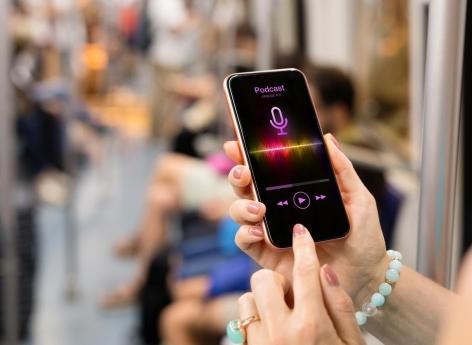Listening to podcasts on mental health reduces the stigmatization of mental suffering, supports the development of knowledge on the subject and promotes help-seeking, according to a new study.

In the car, in the metro, in the office, in the kitchen, in the gym… podcasts are increasingly part of our daily lives. According to one Harris Media study, 5.8 million French people listen to this type of audio content at least once a week. The progression of people who follow it even exceeds 50% per year. And that might just be a good thing for mental health.
A study from University College Cork (Ireland), published in the journal Rural and Remote Health shows that podcasts on mental health have changed the view of mental illness, reduced stigma and effectively directed listeners to appropriate help.
Mental disorders: podcasts promote understanding and compassion
To assess the impact of podcasts related to mental health, Irish researchers carried out an online survey of 722 listeners. Participants reported gaining new perspectives from listening to shows about mental health. This has improved their understanding of these conditions and reduced the stigma linked to mental disorders, according to them.
“Our research found that listeners deepened their own knowledge and vocabulary around mental health topics. Participants noted the importance of having access to trusted experts which was key to this psychoeducation”explains Naoise Ó Caoilte, author of the research, in a communicated.
Volunteers indicated that listening to these broadcasts gave them the knowledge they needed to better understand their own mental health and put their thoughts or emotions into words. The podcasts also helped them to have more compassion towards themselves or people with mental disorders.
“Participants reported that mental health-related podcasts helped them develop a sense of connection with others, learning that it is ‘normal’ to have mental health issues. Many people highlighted the “The importance of connection. Mental health podcasts helped them feel ‘less alone’ in their struggles.”add the researchers in their press release.
The general public is not the only one to benefit from health podcasts. “Our study also reveals that a wide range of professionals, including therapists, teachers and healthcare professionals, use podcasts as a means of continuing professional development and gaining new perspectives”adds Naoise Ó Caoilte.

Mental health: supporting evidence-based podcasts
While some mental health professionals have expressed concerns that podcasts will distract people from professional support, this is not the case according to researchers. “In fact, our study reveals that listening to mental health podcasts encouraged participants to develop a deeper sense of self-compassion and increased positive attitudes toward help-seeking behavior”explains the expert.
For the team behind the work, the results highlight the need for professionals and institutions to support projects providing mental health advice that is neither misleading nor erroneous. “This will allow the public to have confidence that the content is evidence-based, safe and appropriate”concludes Dr Sharon Lambert who also worked on this study.
















